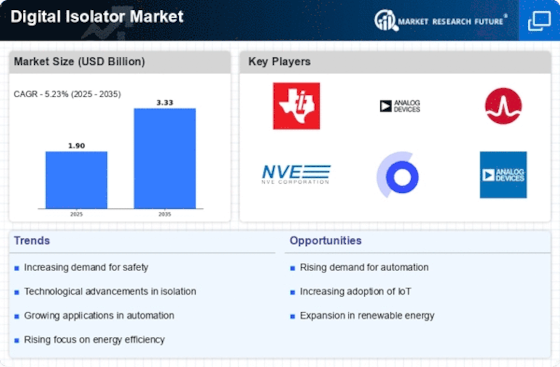Top Industry Leaders in the Digital Isolator Market

Competitive Landscape of the Digital Isolator Market:
The digital isolator market, projected to reach $3.88 billion by 2029, is witnessing a vibrant and dynamic competitive landscape. Established players vie for market share, while new entrants bring fresh perspectives and disrupt existing paradigms. Understanding this competitive landscape is crucial for navigating the market's complexities and making informed business decisions.
Key Players
- Advantech Co Ltd
- Murata Manufacturing Company Ltd
- NXP Semiconductors N.V.
- Broadcom Ltd
- Texas Instruments, Inc
- STMicroelectronics N.V.
- Infineon Technologies AG
- ON Semiconductor
Strategies Adopted by Key Players:
- Product Differentiation: Leading players like Silicon Laboratories, Broadcom, and Texas Instruments are investing heavily in R&D to develop isolators with higher data rates, lower power consumption, and improved isolation capabilities. This differentiation helps them cater to specific application demands and stand out from the crowd.
- Strategic Acquisitions: Mergers and acquisitions are another key strategy. Analog Devices' acquisition of Maxim Integrated, for instance, strengthens their portfolio and expands their reach in the industrial and medical segments. Similarly, Infineon Technologies' acquisition of Wolfspeed bolsters its position in the power isolation market.
- Vertical Integration: Some players like Silicon Laboratories are vertically integrating their production processes, gaining greater control over quality and cost. This enables them to offer competitive pricing and ensure reliable supply chains.
- Geographical Expansion: Emerging economies like China and India are witnessing a surge in demand for digital isolators due to the burgeoning industrial and medical sectors. Companies are actively expanding their presence in these regions to capture this growth potential.
Factors for Market Share Analysis:
- Technology Leadership: Companies with innovative technologies and a strong patent portfolio hold an edge. For example, Broadcom's leadership in transformerless capacitive technology gives them a significant advantage in high-speed applications.
- Brand Reputation: Established players with a proven track record and strong brand recognition enjoy greater market trust. Silicon Laboratories, for instance, is known for its reliability and wide range of isolator solutions.
- Pricing Strategies: Companies employ various pricing strategies to cater to different market segments. Cost-effective solutions appeal to budget-conscious buyers, while premium offerings with advanced features target high-end applications.
- Distribution Channels: A robust distribution network ensures wider reach and faster time-to-market. Companies are leveraging direct sales, channel partnerships, and online platforms to reach their target audience effectively.
New and Emerging Companies:
The digital isolator market is attracting new entrants with innovative solutions and disruptive approaches. Some promising startups include:
- Ciao Semiconductor: Offering ultra-low-power and high-speed isolators for battery-powered devices and industrial applications.
- Power Integrations: Focusing on integrated power and isolation solutions for compact and efficient designs.
- GaN Systems: Pioneering gallium nitride-based isolators with superior performance and reduced power losses.
These new players are challenging established players by offering competitive alternatives and catering to niche market demands. Their presence adds dynamism to the market and encourages continuous innovation.
Industry Developments
Advantech Co Ltd:
- November 2023: Advantech released their newest series of isolated DC-DC converters, the AIE-20D, featuring reinforced digital isolators for superior noise immunity and signal integrity.
- April 2023: Advantech partnered with RECOM to offer a joint solution for medical isolation needs, combining their digital isolators with RECOM's power modules.
Murata Manufacturing Company Ltd:
- October 2023: Murata launched their ISO7 series of high-speed digital isolators with data rates up to 150 Mbps and low propagation delays, targeting industrial automation and medical applications.
- July 2023: Murata collaborated with Xilinx to develop an isolated reference design for industrial motor control systems, leveraging Murata's digital isolators for reliable signal transmission.









